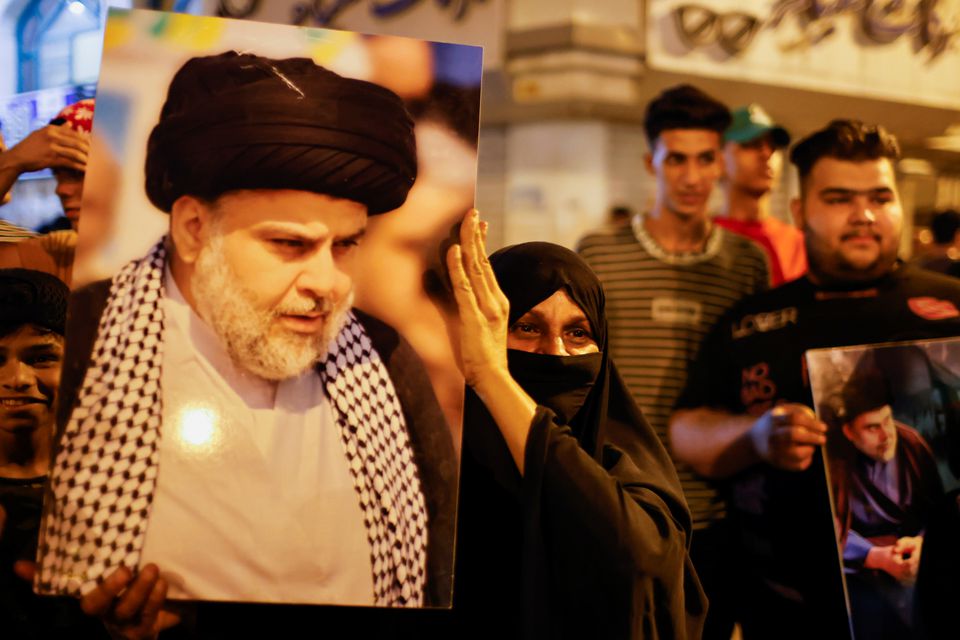As an early voter in the election in December 2005, I recall visiting a polling station for Iraqi nationals in London with my father, who had fled Iraq due to the Baathist state’s persecution decades ago.
Even as a young man, I was highly skeptical as I left the polling station with a newly blue-dyed index finger, the mark of someone who had cast their vote.
But my father insisted we participate: “We can’t let our voices be silenced,” he told me, hopeful for a new era of mass civil participation in politics in a country he had always known to be either a monarchy or a presidential dictatorship.
Since the 2005 election, the muhasasa system that divides power along ethno-sectarian lines has pitted Iraqis at each other’s throats, polarizing society and creating a sectarian environment of persecution and killings. As political elites squabbled over who would get what ministry (and, more importantly, ministerial budgets), they sought out foreign patrons to back their ploys. The two main foreign powerbrokers were, of course, the United States and Iran.
As if it was not bad enough that the sectarian civil war of 2006 to 2008 had almost irreparably torn communities apart — after al-Qaeda bombed Shiite shrines and Iran-backed Shiite death squads killed people merely for being Sunni — the country also became a proxy battlefield for Washington and Tehran to fight or hash out their differences.
As a result, most elections were foregone conclusions. The muhasasa system had created a succession of weak governments and ensured that the prime minister could only be Shiite, the president a Kurd, and the speaker of parliament a Sunni. No one could win an outright majority either, and therefore the parties would coalesce around interest-based coalitions invariably directed either by the United States or Iran. The two foreign powers could then act as kingmakers and decided who would get to sit in the big chair.
This system let an infamously sectarian premier like the leader of the Shiite Islamist Dawa Party, Nouri al-Maliki, stay in high office as prime minister or vice president for almost the entire stretch between 2006 and 2018. Maliki has been blamed as being one of the primary agitators for sectarianism in Iraq, an ideological madness that was directly linked to the rise of the Sunni radical Islamic State.
It is therefore no surprise that a protest movement demanding an end to sectarianism, corruption and foreign meddling took to the streets in 2019 and has been intermittently on the scene since, despite the covid-19 pandemic. The brutalization of this popular movement has resulted in a mass boycott of this week’s unpopular elections. At least 600 protesters were murdered by state security forces and allied Shiite militias, who likely believed that their grip on absolute power might slip if they allowed demonstrators to continue. This violence had the effect of forcing people underground; many report that they now rely on novel blockchain technologies and decentralized virtual private networks to stay hidden and safe as they reorganize.
What the miserly turnout proves is that very few Iraqis believe in democracy anymore, and certainly not the flavor that was forced upon us at gunpoint by the United States and its allies in 2003. These elections simply serve to punctuate what we already know, which is that our vote will be used to justify the mirage of democracy, while a handpicked group of elites will continue to profit as we continue to suffer.
With such deep systemic and structural problems — and with a continued lack of justice for the victims of those murdered by security forces and militias, who act with total impunity — Iraqi politics is doomed to continue on its current trajectory of rot and ruin. I, for one, will not dye my index finger blue for the sake of Iraq’s faux democracy ever again. I am certain I am not alone in my despair.
Source (Click Here)


 RSS Feed
RSS Feed